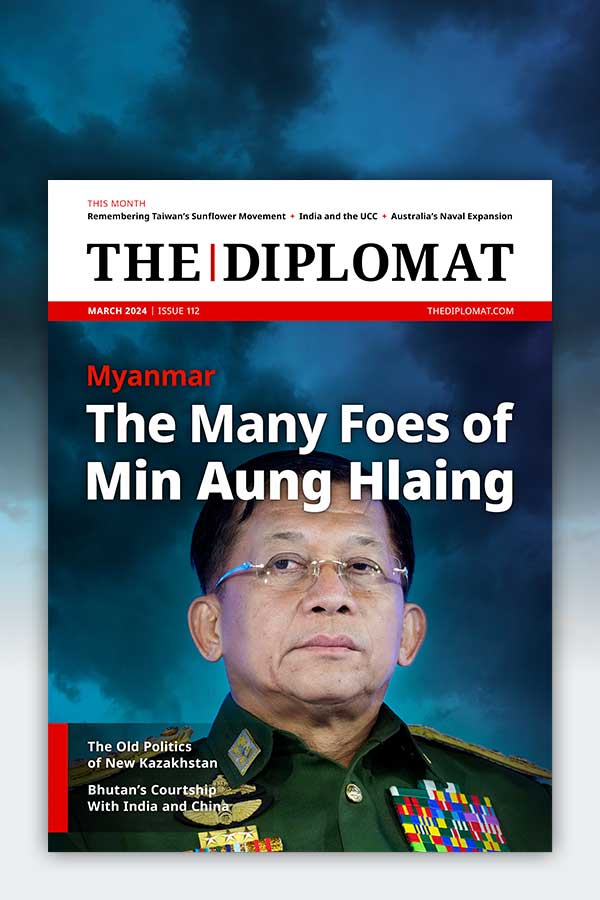| Welcome to the latest issue of Diplomat Brief. This week our top story explores Thailand’s changing approach to Myanmar under new Prime Minister Srettha Thavisin. We also have an interview with Moon Chung-in, former special adviser for diplomacy and national security to South Korean President Moon Jae-in, on inter-Korean relations and North Korea’s goals. |
| Story of the week | ![[object Object]](https://thediplomat.com/diplomat-brief/2024/vol10/images/feature.jpg?v=1) | Diplomacy Is Thailand Reconsidering Its Myanmar Policy?What Happened: As one of Myanmar’s immediate neighbors, Thailand has been impacted by the ongoing conflict next door, including through a growing influx of refugee-seekers. But Thailand’s government had been reluctant to take strong action to address the crisis. Under the new government of Srettha Thavisin, that may be changing. Srettha publicly pledged that Bangkok would take a leading role in addressing the issue, and Thailand has stepped up its efforts to provide humanitarian aid. Our Focus: Thailand’s government may be coming to the realization that Myanmar’s military junta has no meaningful control over wide swathes of the country’s periphery – and thus cannot assure stability. Engagement with the ethnic armed organizations that do assert de facto control over these areas – and the National Unity Government, which has a more credible claim to represent Myanmar’s population – is increasingly necessary for meaningful engagement with Myanmar. Thailand is taking tentative steps in that direction, as seen by a recent parliamentary committee hearing that included NUG representatives. What Comes Next: There’s still a long way to go in Thailand’s Myanmar policy, including better coordination with fellow ASEAN members. But, as authors Brian Wong and Tidarat Yingcharoen note for The Diplomat, “Few other countries in the region possess the level of access, understanding, and insider contacts in Myanmar that Thailand has.” If Bangkok matches that capability with the political will to push for a resolution to Myanmar’s civil war, it could be a game-changer. And that would be a major boost for the diplomatic standing of not only Thailand specifically, but ASEAN as a whole. Read this story |
| Behind the News | INTERVIEW Moon Chung-inMoon Chung-in, former special adviser for diplomacy and national security to South Korean President Moon Jae-in, on strategic signaling from North Korea: “Take, for instance, Kim’s speech from the December 2023 plenary meeting or one from early January. While his language is bellicose in nature, everything is conditional. In other words, Pyongyang’s actions are contingent upon the actions of Seoul and vice versa.” Read the interview |
| This Week in Asia | Northeast Asia China’s ‘Two Sessions’ Focus on EconomyChina’s “Two Sessions” – the annual meetings of the National People’s Congress and the Chinese People’s Political Consultative Conference – are happening in Beijing this week. The NPC, in particular, is closely watched for annual announcements regarding China’s economic growth target and defense budget for the next year. This year, China’s economic policy proposals will be of major interest, as the government attempts to break out of the post-pandemic slump while signaling continued confidence in China’s growth moving forward. Find out more | South Asia Pakistan’s New Government Takes the HelmNearly a month after the general election, which returned a split parliament, Pakistan has a new government: Shehbaz Sharif of the PML-N returns as prime minister, in an alliance with the Pakistan People’s Party. The new government replicates the ruling coalition that took power following the ouster of Prime Minister Imran Khan in a no-confidence vote back in 2022. Sharif will have to hit the ground running. Pakistan is faced not only with major flooding in Balochistan province but also looming talks with the IMF over a much-needed additional bailout. Find out more | Southeast Asia Australian, ASEAN Leaders Meet in MelbourneThis week, leaders from Southeast Asia converged on Melbourne for the second ASEAN-Australia Special Summit. Intended to mark 50 years since Australia becoming the bloc’s first official Dialogue Partner, the March 4-6 summit sought to build on the progress in ASEAN-Australia relations that has taken place since Prime Minister Anthony Albanese took office in 2022. The summit saw Australia commit $46 million to augment maritime cooperation with ASEAN countries. Even as the summit convened, Chinese and Philippine vessels once again collided in the South China Sea, which featured prominently during the summit proceedings. Albanese also announced a $2 billion fund to boost Australian trade and investment in the fast-growing region. Find out more | Central Asia Lights Out and Water Woes in Central AsiaCentral Asia’s primarily mountainous states, Kyrgyzstan and Tajikistan, rely on hydropower to generate electricity. But water levels at Kyrgyzstan’s most important reservoir are tipping toward a dangerously low level that would yield it “dead.” Meanwhile, neighboring Tajikistan's capital lost power last week, the latest sign that similar problems may be afoot at Nurek, which supplies an estimated 50 percent of the country’s power. Hydropower is only as renewable as the water that turns the turbines, and there’s less of it than there used to be. Find out more |
| Visualizing APAC |  | Source: Statistics Korea Seoul is hoping to boost its female economic participation rate, which has hovered around 50 percent over the past decade. See the full picture |
| Word of the Week | Society OqlanmaganUzbek for “unwhitened” or “unexonerated.” The term is used for those swept up in Stalin’s purges as well as those convicted of religious extremism under Islam Karimov. Find out more |
|  |

![[object Object]](https://thediplomat.com/diplomat-brief/2024/vol10/images/feature.jpg?v=1)

